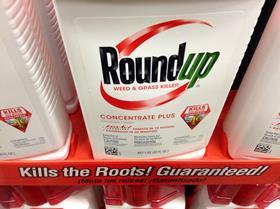
A leading US toxicologist has accused the EU of downplaying the risk of cancer posed by glyphosate in an open letter to European Commission president Jean-Claude Juncker.
In the letter, Christopher Portier wrote that the European Food Safety Authority (EFSA) and the European Chemicals Agency (ECHA) had “failed to identify all statistically significant cancer findings” when concluding that glyphosate – the active ingredient in Monsanto’s Roundup herbicide – is not carcinogenic to humans.
The study, issued in March, has paved the way for the European Commission to restart negotiations with EU member states on the renewal of the licence for glyphosate. But Portier claims the final assessments are inadequate to support the chemical’s re-authorisation.
The scientist, a former associate director of the National Institute of Environmental Health Sciences (NIEHS) in the US, claims that eight instances of “significant increases in tumor response” were not included in the EU agencies’ assessments – for which rodents were tested for cancer after being exposed to glyphosate.
“This suggests that the evaluations applied to the glyphosate data are scientifically flawed, and any decisions derived from these evaluations will fail to protect public health,” he wrote.
Portier is asking that the evaluations by both the EFSA and ECHA be repeated “for all toxicological endpoints” and that the data be publicly released.
He praised the EFSA for being transparent and “allowing limited access” to the raw data from the animal studies. But he said the tumours indentified in the study could be interpreted as “a failure” by the agencies “to carefully review and analyse all of the available data” before reaching a decision.
It was also noted in the letter that, in 2015, the International Agency for Research on Cancer (IARC) Monographs Program concluded that glyphosate should be classified as 'probably carcinogenic to humans.'
The scientist’s letter comes shortly after the European Commission proposed to extend its approval for the weed killer by 10 years, despite opposition from environmental groups.
As yet, no date has been set for when discussions with EU member states will begin.
According to Reuters, analysts have calculated that Monsanto could lose up to $100 million in sales if glyphosate were banned in Europe.
In 2010 the chemical was registered in over 130 countries, according to data published by the IARC. It is one of the most used herbicides in the world.



